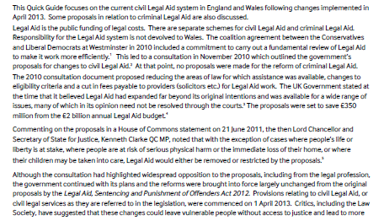On Tuesday 19 March there will be a plenary debate on the impact of welfare reform on households in Wales. The Welsh Government recently published new analysis on the effect of welfare reform in Wales, including the rollout of Universal Credit (UC).
By 2023, around a third of households in Wales will claim Universal Credit in some form.
As of November 2018, 61,466 households in Wales were claiming the new benefit, and 292,212 were claiming ‘legacy’ benefits that will eventually be replaced by Universal Credit. This means that the rollout of Universal Credit is 17% complete in Wales.
However, the Welsh Government and Citizens Advice estimate that by 2023, 400,000 Welsh households will be on UC, indicating that the rollout is only 15% complete.
You can see the latest constituency estimates for Universal Credit roll-out in this tool from the House of Commons Library.
What is Universal Credit?
Universal Credit is a new social security benefit that is being gradually rolled out across the UK. It replaces six means-tested benefits and tax credits for working-age people and families (known as ‘legacy’ benefits), which are:
- Housing Benefit;
- Working Tax Credit;
- Child Tax Credit;
- Income-Based Jobseekers’ Allowance;
- Income-Based Employment and Support Allowance, and
- Income Support
Other benefits such as Disability Living Allowance (DLA)/ Personal Independent Payment (PIP), Child Benefit and Carers Allowance are not being replaced by UC.
Roll-out in Wales
UC began to roll out in 2013 and the UK Government had intended the roll-out to be complete by October 2017. IT and admin issues led to successive delays, and it is now expected to be complete by December 2023.
All Jobcentres in the UK are now ‘full service’, which means that new claims for legacy benefits cannot be made (with limited exceptions). Legacy benefit claimants do not move onto UC straight away, but a change in circumstances may trigger a move to UC, known as ‘natural migration.’
Existing benefit claimants who have not had a change in circumstances will be moved over to UC between July 2019 and December 2023, known as ‘managed migration’. This will begin with a 6 month trial in Harrogate.
A November 2018 report of the House of Commons’ Work and Pensions Select Committee raised serious concerns about managed migration.
Impact of Universal Credit
The actual impact of UC is hard to judge because the design of the benefit has changed significantlysince the DWP published its original impact assessment in 2012. When asked if the assessment would be updated, the UK Governmentsaid that “whilst there have been changes to Universal Credit since the impact assessment in 2012, these have not fundamentally altered the service.”
In October 2018, the UK Government defeated a Labour attempt in the House of Commons to force the release of its most recent analysis of the impact of UC.
The Welsh Government published a range of welfare reform impact assessments between 2012 and 2015.
New Welsh Government analysis published in March 2019 provides an overview of the impact of Universal Credit on households in Wales (from page 21).
The Equality and Human Rights Commission (EHRC) published a cumulative impact assessment of tax and welfare reforms in March 2018, which includes data for Wales.
Problems and changes to Universal Credit
As noted in our previous blog post from October 2017, there are a range of long-running concerns about the introduction of Universal Credit.
Work allowance
When claimants start work, UC is withdrawn at a rate of 63p per pound earned (this was dropped from 65p from April 2017). But claimants can keep some of their earned income (the ‘work allowance’) before it begins to affect their UC. The work allowance was cut from £6,420 to £3,850 in the UK Government’s 2015 summer budget.
But the UK Government increased the work allowance for people with children or a limited capability for work by £1,000 from April 2019. The Institute for Fiscal Studies (IFS) estimated that this change will benefit 2.4 million UK households, allowing them to keep an extra £630 of their income each year.
Waiting times
Waiting times for the first payment of UC are significantly longer than those for ‘legacy’ benefits. The waiting period for UC was increased to six weeks following the introduction of an additional seven day waiting period in 2015.
In 2017, the seven day waiting period was removed, reducing the overall wait from six to five weeks.
The Welsh Government’s new analysis states that (based on research by the Trussell Trust in 2017-18) the wait the first payment was found to be a key cause of a rise in foodbank use:
“12 months after UC rollout in an area, foodbanks saw a 52% increase in demand compared to an increase of 13% in areas that had not yet gone live with UC or had been live for 3 months or less”.
Paying rent directly to landlords, splitting payments and payment frequency
Alternative Payment Arrangements (APAs) were introduced in 2013 and are available for claimants who can’t manage the standard UC payment.
There are three types of APA:
- direct payment of the housing cost element to landlords (known as managed payments);
- splitting of payment between members of a couple, and
- more frequent payment of benefit
The Welsh Government’s new analysis found:
“Of the 22,630 households in Wales receiving a payment of UC with entitlement to support for housing costs in August 2018, DWP statistics show 20 per cent had their housing costs paid directly to a landlord.
DWP statistics also show only 1 per cent (540) of households in Wales receiving a payment of UC in August 2018 had their payment divided over the month to be paid in two, or four, instalments, via a More Frequent Payment Alternative Payment Arrangement (APA).
A negligible number of households had their UC payment divided between both members of a couple, via a Split Payment APA.”
The current guidance on APAs was updated in April 2018 to ensure that UC claimants are offered that option at the start of their UC claim. In January the UK Government also announced the creation of an online system for private landlords so they can request for their tenant’s rent to be paid directly to them.
It also said “more will be done” to ensure that UC is split between men and women in a household.
In 2017 the Scottish Government used its new welfare powers to allow tenants to request direct payments for rent and services, and to request twice monthly payments, known as ‘Universal Credit Scottish Choices’ (UCSC).
The Assembly’s ELGC Committee is currently exploring whether similar powers over UC should be devolved to Wales.
‘Run ons’
In November 2017, the UK Government announced that people moving from legacy benefits would be given two weeks of extra Housing Benefit during their five week wait for UC (known as a ‘run on’).
From July 2020, two weeks of run on will also be introduced for existing claimants of Jobseekers Allowance and Employment and Support Allowance. But this means that people who move onto UC during between now and July 2020 cannot benefit from this change.
Advance payments
The DWP can award an advance payment of UC for new claimants who expect to struggle meeting essential expenditure while they are waiting for their first payment.
In 2017 the UK Government changed the maximum award to 100% (up from 50%) of the estimated final award, and offered them to everyone. It also extended the period of repayment, so claimants have 12 months to pay them back rather than 6 months.
Deductions
In the November 2018 Budget, the UK Government reduced the proportion of UC that can be deducted to repay existing debts from 40% to 30% of the standard allowance – typically from £127.13 to £95.35.
While welcomed by Citizens Advice, they still had concerns that “deductions in Universal Credit were taken from more than half of all payments in September 2018”.
Rent arrears
Some have argued the design of UC (such as the initial wait for the first UC payment, rent being paid directly to the claimant (rather than the landlord), and claimants moving from weekly or four-weekly benefit payments to a monthly payment) has led to an increase in rent arrears.
Community Housing Cymru report that housing association tenants on UC in Wales are already in over £1 million of rent arrears debt, according to their survey of a sample of 29 housing associations in Wales.
Research by Citizens Advice also found that people in receipt of UC were more likely to have priority debts (including rent arrears and council tax arrears) than those on legacy benefits.
Sanctions
Sanctions are reductions or suspensions of benefit payments because a person has not met the conditions of UC. This could involve failing to attend jobcentre appointments or refusing to accept a job.
Between August 2015 and November 2018, 51,303 sanctions were applied to UC claimants in Wales. The vast majority were the second lowest level of sanction. Research highlighted in the ELGC Committee’s 2017 inquirysuggested that a sudden loss of income by removing benefits could result in “severely detrimental financial, material, emotional and health impacts”.
Housing support for 18-21 year olds
The 2015 budget announced that some 18-21 year olds claiming UC would not be entitled to help with housing costs. However, at the end of March 2018, the UK Government reversed this decision, so that all 18 to 21 year olds would be entitled to claim support for housing costs within UC. This change would have affected 500 people in Wales by 2020-21, according to the Welsh Government’s analysis.
Restrictions for families with more than two children
From 2017, the family element of UC (which awards extra money for each child) was restricted to the first two children in a family.
However, the UK Government announced on 11 January that families making a new UC claim whose children were all born prior to the implementation of the policy (i.e. 6 the April 2017) would be exempt from this policy (estimated to benefit 15,000 families across the UK).
But for families where the third child is born after April 2017, this change will have no effect and will not change the long-run impact of the policy, as eventually all children will be born after April 2017, with various exemptions for multiple births and adoptions etc.
Article by Hannah Johnson, Senedd Research, National Assembly for Wales








